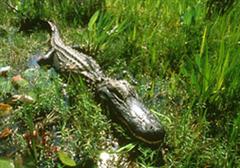Alligator - American
Mississippi Alligator, Pike Headed Alligator Scientific Name: Alligator mississippiensis
Mon, 28th April, 2025 - 9:43 am GMT
Sponsor Ads:

Alternative Name
Mississippi Alligator, Pike Headed Alligator Scientific Name: Alligator mississippiensisBasic Info
By the time they are 20 years old, American Alligators are generally around 12.5 feet long! Their snouts are quite broad, and they exhibit a bit of an over bite. American Alligators have a bony nasal ridge. Although adults range from dull olive green to brown, juvenile animals are black with yellow markings. Their eyes are silver to gray in color. American Alligators have short and stocky or long and thin body types. American Alligators have 74 to 80 teeth. When they lose teeth, a new tooth will grow in. American Alligators have webbed feet to aid them in swimming, and their eyes and nostrils are located high atop their heads to allow them to keep most of their body submerged, while still allowing them to watch for prey and breath.
Health
Because of their large size and expensive requirements, American Alligators are generally not recommended for beginning crocodilian keepers. Breeding Generally, female American Alligators have reached sexual maturity by the time they are between five and six feet in length. Courtship behavior involves several forms of communication include bellowing, scent marking, and slapping of the head on the water. For several hours, mating pairs may rub snouts and backs. In early summer, American Alligators build nests of vegetation and mud, in which they will deposit about 40 eggs. Generally, the eggs take around 65 days to incubate after they have been covered with vegetation, and the female remains in the area to guard them. The mother American Alligator will break open the nest to assist the babies in hatching and will carry them to the water, where they will form a pod and remain with the mother for about three years.Habitat
Found in the wild throughout southern parts of North America, especially the southern United StatesBehavior
The American Alligator is a massive and impressive reptile that has captured the imagination of people all around the world. Although baby American Alligators may appear cute and easy to care for, be warned! They will grow about a foot and a half each year and may quickly become quite difficult and expensive to care for. For those who have the experience, space, and budget for a large and dangerous animal, the American Alligator makes an interesting pet. Although American Alligators are more docile than many crocodilian species, they do reach an extremely large size, making them potentially more dangerous than smaller animals. They prefer freshwater habitats although they can tolerate a certain amount of salt in the water and are commonly found in freshwater swamps. American Alligators dig burrows that they use in cold weather, and will cross land to find wet areas when the region in which they live dries up. Generally, fish, insects, carrion, and even the occasional small mammal are eaten. When water temperature falls below about 70 degrees Fahrenheit, the American Alligator will stop eating. Generally, they hiss when upset. In captivity, commercial alligator chow is available on which to feed your animal. Generally, they will also do well when offered small mammals like mice or rats, in addition to fish or insects. Larger animals may eat chickens or rabbits, and an adult American Alligator may consume about 20 pounds of food each week. Although they do very well in outdoor enclosures including large ponds, they may also be kept inside if their owner lives in inappropriate climates. Although more tolerant of cold than other species, American Alligators usually do well when kept in a temperature of about 85 degrees Fahrenheit with a night time drop and a warmer basking spot.Origin
Southern United StatesHistory
American Alligators are commonly farmed, and thus are commonly distributed as pets. Captive raising prevents them from becoming scarce, and they are quite frequently found in the wild throughout southern parts of North America, especially the southern United States. At one point, the American Alligator was quite endangered, but has now made a recovery. They were hunted until the late 1960's when it was declared illegal. Today, they are farmed for their skin, which is valued in the leather industry. American Alligators are also displaced by habitat loss and humans do not like them to live too close to their habitations. When relocated, some Alligators will return to their original territories and may become nuisances.Common Foods
N/ASponsor Ads:
Extreme boredom serves to cure boredom. -- Unknown
Alligator - American
Coded by: BGID® | ALL RIGHTS RESERVED Copyright © 2000-2025
Disclaimer | Privacy | Report Errors / Contact | Credits


 Why haven't we as a collective earth met with aliens yet?
Why haven't we as a collective earth met with aliens yet?  The Best Text Adventure You Will Ever Play! The official site:
The Best Text Adventure You Will Ever Play! The official site:  Homosexual behavior stems from the mind or genetics?
Homosexual behavior stems from the mind or genetics?  World EcoSystem - Biodiversity Changes - Who is on board and who isn
World EcoSystem - Biodiversity Changes - Who is on board and who isn  Mouthwash - Mouthrinse - Mouth Sores - Healing Infections - Gingivitis
Mouthwash - Mouthrinse - Mouth Sores - Healing Infections - Gingivitis  Treatment for Depression
Treatment for Depression  Ultra radical and violent Islamist group that even rivals Al Qaeda
Ultra radical and violent Islamist group that even rivals Al Qaeda  An idea to have teachers who want to carry guns to school undergo some level of police training will be left up to local school districts and police departments.
An idea to have teachers who want to carry guns to school undergo some level of police training will be left up to local school districts and police departments.